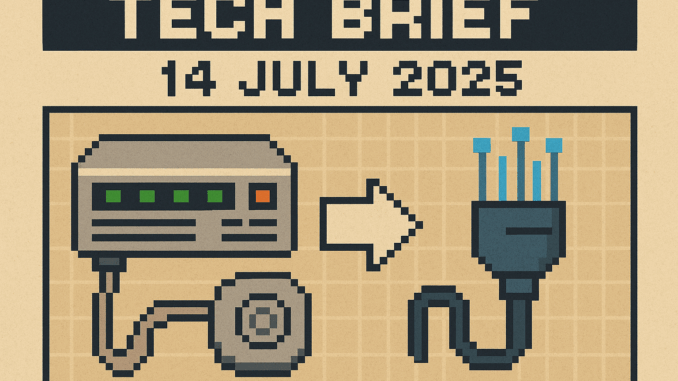
Tech Brief – 14 July 2025 delivers the day’s essential updates in DOCSIS 4.0 broadband, Windows 11 security, and space logistics. If you ever watched a progress bar crawl across a 486, you’ll appreciate how far we’ve come. Missed yesterday’s Tech Brief? Catch up here before diving in. Today’s stories connect real infrastructure breakthroughs with the technical grit that built the internet’s backbone.
Teleste and VodafoneZiggo launch next-gen DOCSIS 4.0 broadband with 1.8 GHz technology
Europe’s first major rollout of DOCSIS 4.0 using 1.8 GHz technology is underway in Amsterdam, driven by Teleste and VodafoneZiggo. This deployment promises symmetrical 10 Gbps speeds and real-time network diagnostics, a massive leap beyond what most UK homes have ever seen outside specialist labs.
The 1.8 GHz upgrade enables not just speed, but also network flexibility-vital for streaming, gaming, and remote work. Teleste’s statement highlights how the expanded spectrum pushes cable networks into fibre-rival territory, all while keeping legacy coaxial cable in play. For users, this means faster, more reliable broadband without a full rewiring-think of the early days of ADSL piggybacking on old copper lines. The initial phase rolls out in Q3 2025, with broader expansion to follow. If you remember the thrill of your first cable modem finally trouncing a 56k US Robotics, this is a genuine infrastructure milestone.
NCSC Urges Enterprises to Upgrade to Windows 11
The UK’s National Cyber Security Centre (NCSC) has issued a blunt warning: enterprises must migrate from Windows 10 before Microsoft support ends in October 2025. Many organisations are still clinging to legacy systems, exposing themselves to critical vulnerabilities. The NCSC singles out the risk of unpatched exploits, especially as threat actors increasingly target unsupported operating systems.
For IT veterans who lived through the scramble from Windows NT to 2000, or the XP end-of-life panic, this will sound all too familiar. The guidance is clear: upgrade now or risk business continuity. Windows 11 offers improved hardware-based security, including TPM (Trusted Platform Module) requirements. For those managing mixed environments, the challenge remains balancing legacy compatibility with modern defences-a tension as old as the first networked office.
NCSA launches cyber security youth summer camp 2025
Why invest in student hackers? Qatar’s NCSA (National Cyber Security Agency) has launched a hands-on summer camp to train the next generation in threat analysis and digital defence. Announced 13 July, the 2025 camp partners with universities to give students practical exposure to real-world cyber threats.
The curriculum covers everything from malware forensics to ethical hacking-skills that would have made you the hero of the school computer club in the 90s. This is about more than skills; it’s about building a cybersecurity workforce pipeline. The NCSA’s approach mirrors the Gen-X ethic of mentoring and hands-on learning, but with the urgency of today’s threat landscape. For industry, it means a deeper bench of talent ready to tackle ransomware and supply chain attacks-problems that didn’t even have names back in the days of floppy disks.
Tianzhou-9 poised for record-breaking supply mission to China Space Station
The Tianzhou-9 cargo spacecraft is set to launch with a record 6.5 tons of supplies for China’s space station, carried by the Long March-7 Y10 rocket. This mission sets a new bar for Chinese space logistics and demonstrates the maturing autonomy of spacefaring infrastructure.
The payload includes scientific instruments, crew supplies, and replacement hardware, all managed with a level of automation that would have seemed pure science fiction in the 1980s. If you ever watched Challenger and Mir dockings on grainy telly, this is a clear sign of how orbital operations have advanced. China’s space programme now rivals the scale and ambition of the shuttle era, but with modern efficiency and data-driven planning. The implications are clear: space logistics is no longer the bottleneck it once was, opening the door for more routine resupply and research missions.
Apple smart home hub may not launch before 2026
Apple’s much-anticipated smart home hub is delayed until at least 2026, according to industry reports citing manufacturing snags with its dedicated controller hardware. The device was originally slated for late 2025, but supply chain complexities have pushed the timeline back.
Anyone who remembers the endless wait for the original Power Mac G4 or the BBC Micro finally arriving at your local Dixons will recognise the pattern. Apple’s home-automation push is now on pause, giving rivals like Google and Amazon more time to entrench their ecosystems. For users, it means holding off on any all-in-one Apple home upgrades. For the industry, it’s a reminder that even tech giants can stumble when hardware meets supply chain reality-a lesson as old as the first big hardware launches in the 80s and 90s.
From the Wayback Machine
On This Day: 1918 – Birth of Jay Forrester, inventor of magnetic core memory. Forrester’s work at MIT in the late 1940s and early 1950s transformed computing by introducing reliable, random-access memory. Before core memory, computers relied on slow, fragile methods like mercury delay lines. Forrester’s design stored data in tiny magnetic rings, enabling real-time processing and massive reliability gains. His invention powered the Whirlwind computer and, later, the SAGE air defence system-both foundational to modern interactive computing. Core memory’s principles live on in today’s DRAM and SRAM. Forrester’s interdisciplinary approach, blending engineering and systems thinking, still shapes how we build and manage large-scale tech. The next time your device boots instantly, you’re seeing the legacy of a 1940s breakthrough.
What This Means
Tech Brief – 14 July 2025 shows that today’s infrastructure leaps, security warnings, and hardware delays all build on decades of technical progress. Whether you’re wiring up Amsterdam or prepping for space, resilient systems and skilled people remain essential. Each story is a reminder that today’s tech rests on the work of past innovators.
Every upgrade, delay, or milestone is another line in tech’s evolving source code. What was your first broadband leap, or the tech delay that made you wait?
Missed yesterday’s Tech Brief? Catch up here.

Leave a Reply